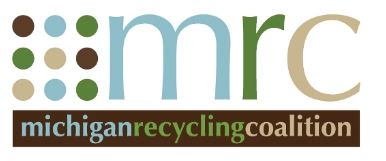The Michigan Recycling Coalition (MRC) represents recycling and composting interests statewide. The Coalition is a recognized authority on waste reduction, beneficial utilization, recycling, and composting through the experience of its Staff and Committees.
The MRC was started almost 30 years ago by a group of passionate individuals who shared a vision to advance resource conservation issues in our great state. It is governed by a 15 member Board of Directors representing public, private and nonprofit agencies across Michigan. The MRC's work is carried out by a variety of committees and staff.
Our Vision - Members of the MRC look forward to a future...
- Where natural resources are managed to the environmental and economic benefit of every community.
- Where all possible uses for a given material are exhausted before being managed as waste.
- Where waste is managed in a way that causes minimal harm to habitat, wildlife and the environment.
- Where Michigan's high public & private waste diversion and participation rates are common knowledge and a source of State pride and economic benefit.
- Where recycling and composting are vital and sustainable services and collected materials have value in industries globally.
- Where the MRC and its members are recognized, influential leaders in effective resource use and recovery throughout the state.
When does recycling work?
Recycling happens when there is a positive economic value on the material to be recycled. For example, if it costs more to cut down trees to make paper than it does to process recycled paper back into other paper products, then there will be a demand for recycled paper. If, however, making paper from trees costs less than making paper from recycled paper then recycling is much less likely to happen. This basic economic principle changes when state or local policies are enacted to influence the behavior of individuals, businesses, institutions and government to have a positive impact on the environment and/or economy.
How does recycling work?
- Recycling is simply a matter of separating recyclables from trash and preparing them for collection by local haulers. Haulers transport collected recyclables to a local processing or material recovery facility (MRF), where these recyclables are further separated and baled into specific commodity categories. Recycling programs differ across Michigan. Communities often offer different services and collect different materials, based on their relationships with the companies that are willing to purchase the recycled commodities they produce.
- It’s important to know what kind of materials are collected and recycled in your community, so you can contribute in a positive way. If community residents and businesses are including materials that may be recyclable in a program that does not accept those items, the resulting contamination can become a serious enough issue where entire loads of recyclables have to be landfilled.
- Single-stream recycling is a relatively new way to manage recyclables. All materials are placed loosely in one curbside cart for quick and easy curbside pick-up and taken to a modern material recovery facility (MRF) that sorts all the material for baling and selling. Single-stream recycling has become popular because it reduces collection costs, while increasing the number and types of materials that can be collected at the curb. Single-stream programs often require larger recycling carts to accommodate the increased volumes of recyclables. However, single-stream recycling programs aren’t available and don’t make sense for every community and that’s why it’s important to know how recycling works best in your community.
Metal Recycling
We manufacture metal products using naturally occurring minerals found deep in the earth’s crust. Harvesting these minerals takes time, energy, and uses up a limited resource. Recycling metal products helps offset these costs. For example, manufacturing a new aluminum can from recycled aluminum takes only 5% of the energy as it would to manufacture the same can from raw materials! There are many different types of metal that have been recycled for a long time. Scrap yards often accept copper, aluminum, brass, and steel. These yards can be found in almost every community in Michigan, as metal retains its value over time.
Electronics Recycling
As household appliances become more energy efficient, many utility companies are providing incentives to recycle old appliances. Refrigerators and freezers, air conditioners and dehumidifiers require a lot of energy and more effiicient models will save you money. These appliances also contain freon, which is harmful to the environment if released, so proper handling is important. Conact your local utility and inquire about appliance recycling programs that make recycling easy. HP, Apple, and other computer manufacturers have programs for takeback as well.
Stoves, dishwashers, washers and dryers all contain enough metal to be valuable. Talk to your local waste hauler about recycling options for these and other household appliances. You may be able to have it collected from your curb for a small fee. You may also be able to deliver it to a special collection program, or even make a little money at the local salvage yard.
Paper Recycling
Paper is manufactured most commonly from the pulp of wood. To accomplish this, trees must be harvested and chipped, combined with water, pulped, dried, and pressed into thin sheets. The method of harvesting trees varies, with some being more sustainable than others, but every method uses some amount of this finite resource. Unlike other recyclables, paper fibers have a limited recycled life. Higher quality papers require longer fibers. The recycling and remanufacturing process shortens the fibers and makes the recycled paper suitable for alternative and/or lower quality products. It is estimated by the EPA that manufacturing paper from recycled content requires only 60% of the energy it would take to manufacture the same product out of raw materials.


 Member
Member